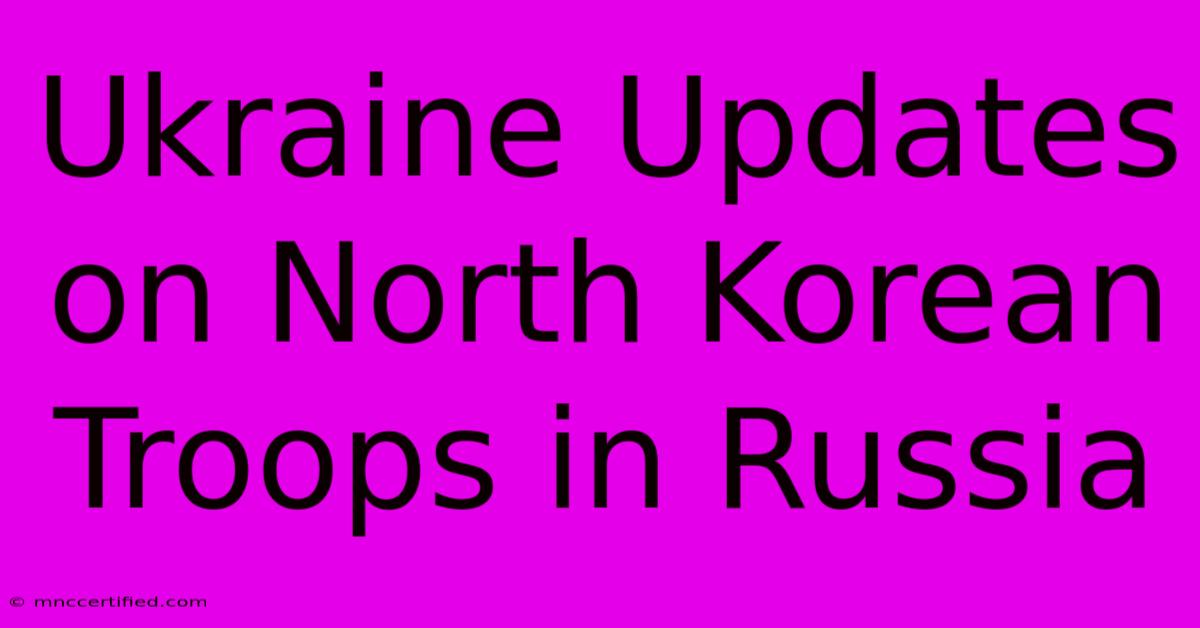Ukraine Updates On North Korean Troops In Russia

Table of Contents
Ukraine Updates on North Korean Troops in Russia: Separating Fact from Speculation
The potential deployment of North Korean troops to support Russia's war in Ukraine has generated significant international attention and fueled considerable speculation. While official confirmation remains elusive, analyzing available information from Ukrainian officials and independent sources allows us to separate fact from speculation and understand the evolving situation. This article will delve into the latest updates, analyzing the implications of such a deployment and examining the credibility of various reports.
The Claims: What Ukraine is Saying
Ukraine has been the primary source of allegations regarding North Korean troop deployments. Their claims generally center on the idea that North Korean soldiers are being sent to bolster Russia's depleted forces. These assertions, however, often lack concrete evidence, relying on intelligence reports and unspecified sources. It's crucial to critically assess the information provided, considering the inherent bias and potential for strategic communication in a conflict zone. Verifying the claims independently is paramount.
Lack of Concrete Evidence: A Critical Analysis
While Ukrainian officials have repeatedly raised concerns, the absence of definitive photographic or video evidence, precise troop numbers, and deployment locations weakens the credibility of these reports. Such a significant troop movement would likely be difficult to conceal completely, raising questions about the reliability of intelligence gathering and dissemination.
Independent Verification and International Reaction
The international community's reaction has been mixed. Some countries have expressed concerns, echoing Ukrainian statements, while others have called for more concrete evidence before issuing strong condemnations. The lack of widespread independent confirmation from trusted international organizations or intelligence agencies contributes to the uncertainty surrounding this issue.
Analyzing the Strategic Implications
Even if the claims are partially true—meaning a smaller number of North Korean troops or support personnel are deployed—the strategic implications are still significant. It could signal a deepening partnership between Russia and North Korea, potentially leading to increased military cooperation and further destabilizing the region. This alliance could also impact global power dynamics and complicate ongoing international efforts to address the conflict in Ukraine.
The Role of Disinformation and Propaganda
The information landscape surrounding this issue is fraught with disinformation and propaganda. Both sides of the conflict have incentives to manipulate the narrative for strategic gains. Therefore, it’s vital to adopt a critical and discerning approach to all information encountered, verifying it against multiple reliable sources.
Separating Fact from Fiction: A Guide for Readers
To navigate this complex situation, readers should prioritize information from:
- Reputable international news organizations: Look for reports backed by solid evidence and cross-referenced with other credible sources.
- Official government statements (with caution): Be aware of potential bias in official statements and seek independent verification whenever possible.
- Fact-checking websites: These organizations specialize in verifying information and identifying misinformation campaigns.
Conclusion: The Need for Further Investigation
The alleged deployment of North Korean troops in Russia remains a developing situation, shrouded in uncertainty. While Ukrainian claims warrant attention, the lack of concrete evidence necessitates a cautious and critical approach. Continued investigation by independent sources and international organizations is crucial to establishing the truth and understanding the potential implications of this potentially significant development in the ongoing war in Ukraine. Further updates and verifiable evidence are needed to paint a clearer picture of the situation. Until then, it's imperative to rely on verifiable information and avoid spreading unsubstantiated claims.

Thank you for visiting our website wich cover about Ukraine Updates On North Korean Troops In Russia. We hope the information provided has been useful to you. Feel free to contact us if you have any questions or need further assistance. See you next time and dont miss to bookmark.
Featured Posts
-
Daniel Jones Benched Was It Right
Nov 19, 2024
-
Insurance Adjuster Not Responding
Nov 19, 2024
-
Trumps Carr Fcc Chairmanship Outcomes
Nov 19, 2024
-
St Augustine Homeowners Insurance
Nov 19, 2024
-
Boise State Starts 4 0
Nov 19, 2024